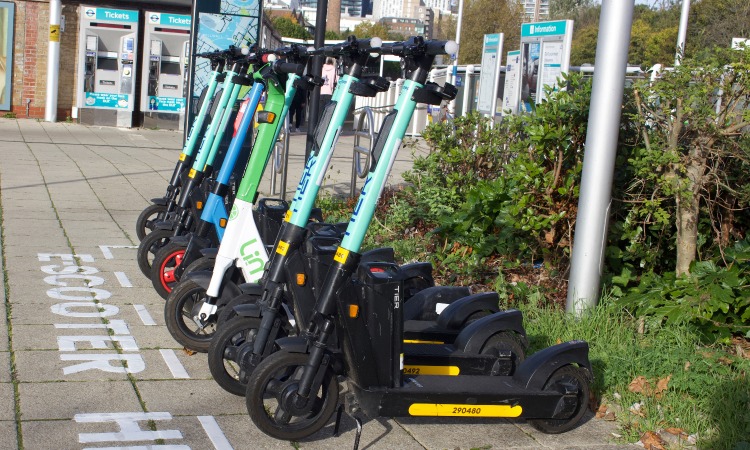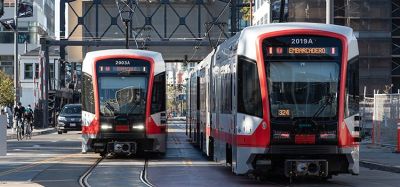TfL to extend London’s e-scooter trial following national trial extensions
- Like
- Digg
- Del
- Tumblr
- VKontakte
- Buffer
- Love This
- Odnoklassniki
- Meneame
- Blogger
- Amazon
- Yahoo Mail
- Gmail
- AOL
- Newsvine
- HackerNews
- Evernote
- MySpace
- Mail.ru
- Viadeo
- Line
- Comments
- Yummly
- SMS
- Viber
- Telegram
- Subscribe
- Skype
- Facebook Messenger
- Kakao
- LiveJournal
- Yammer
- Edgar
- Fintel
- Mix
- Instapaper
- Copy Link
Posted: 26 October 2022 | Intelligent Transport | No comments yet
The trial extension will allow TfL and London Councils to continue collecting data on e-scooter usage, as well as test new innovative technology, such as audible alerts, to improve safety for pedestrians.


Transport for London (TfL) and London Councils have announced that they are extending the capital’s trial of rental e-scooters in response to recently updated Department for Transport (DfT) guidance that allows local authority trials to continue until 31 May 2024.
This extension follows the recent UK government announcement of its plans to create a new vehicle category in legislation, in which e-scooters would be included. Continuing the trial of rental services will ensure that London can continue to learn about e-scooters and the role that they can play in the capital’s transport offer.
The trial has thrived since its launch in June 2021, with 10 boroughs participating, more than 500 designated parking locations available, almost two million journeys made and 4,425 e-scooter vehicles now available for hire.
A competitive procurement for operators to run the next phase of London’s rental e-scooter trial has been launched and operators will be chosen on their ability to meet strict safety requirements and high operating standards. The high safety requirements and high operating standards seen in the current trial will be further enhanced for the next phase, accounting for what has been learnt from the trial to date, feedback from customers and stakeholders, improvements in technology and what has been learnt from other cities and countries.
The contracts let under the new procurement may run for longer than the DfT national trial term (which ends on 31 May 2024) in anticipation of new legislation being passed. To ensure there is a continuation of service in London, the current trial contracts operated by Dott, Lime and TIER Mobility, which expire in 2022, will be extended temporarily until the procurement is complete.
Privately owned e-scooters remain illegal for use on public land, including public roads. Vehicles used in the trial will continue to exceed DfT’s regulatory requirements and will continue to be considerably more robust than the most common private e-scooters. Learnings from the trial are informing government legislation around any legalisation of privately-owned e-scooter vehicles.
Will Norman, London’s Walking & Cycling Commissioner, said: “The e-scooter trial has proven to be popular, with more than two million trips already taken, and this next phase of the trial will build upon this, replicating the high safety requirements and high operating standards, and continuing to learn through testing newer technology to ensure that these vehicles work for everybody. With the right regulations that prioritise safety, rental e-scooters can help ensure a green, sustainable future for London”.
Helen Sharp, TfL’s E-scooter Trial Lead, said: “E-scooters could play an important role in ensuring a green and sustainable future for London, which is why we’re really pleased to be able to extend the e-scooter trial. We’re working closely with London Councils on our plans for the next phase of the trial, which will help us build on its successes so far. We hope Londoners can continue to benefit from the trial and we will continue to use its data to learn more about the role e-scooters could play in helping people move around London sustainably.”
Georgia Yexley, General Manager of TIER Mobility UKI, said: “Since London’s e-scooter trial began in 2021, it has been fantastic to see it expand to more boroughs and witness so many people take up our e-scooters as a regular form of transport across the city. As the capital continues to reduce its dependency on cars, TfL’s renewed, longer-term commitment to e-scooters validates the success of the scheme to date and is a welcome next step in encouraging more Londoners towards a more sustainable and cleaner form of transport.”
If you liked this, you may also be interested in:
Related topics
Air Quality, Micro-mobility, Mobility Services, Passenger Experience, Sustainable Urban Transport, Transport Governance & Policy
Related modes
Bikes & Scooters
Related cities
London
Related countries
United Kingdom
Related organisations
Dott, Lime, TIER Mobility, Transport for London (TfL), UK Government
Related people
Georgia Yexley, Helen Sharp, Will Norman








